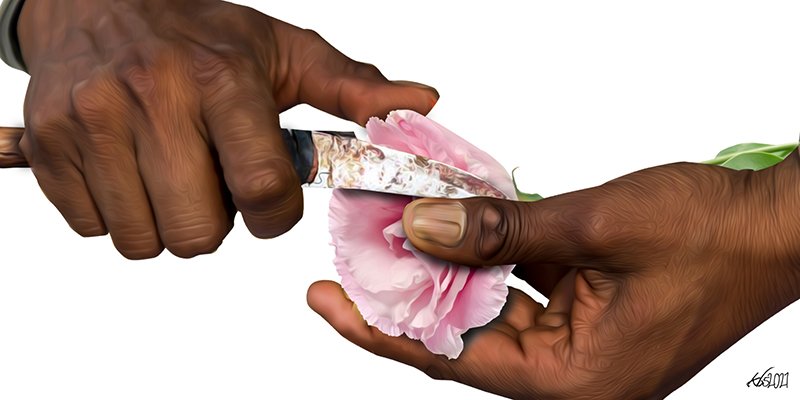Somaliland: Female Genital Mutilation Is!amic ‘cutters’ go door-to-door to perform the procedure on young girls


“It is a religious thing. Do you want to change religion?” said one Egyptian in response to a campaign to eradicate female genital mutilation. “You only listen to what the West is saying.”
The establishment media ignores the fact that FGM is mandated in Islamic law: “Circumcision is obligatory (for every male and female) (by cutting off the piece of skin on the glans of the penis of the male, but circumcision of the female is by cutting out the bazr ‘clitoris’ [this is called khufaadh ‘female circumcision’]).” — Umdat al-Salik e4.3, translated by Mark Durie, The Third Choice, p. 64
Why is it obligatory? Because Muhammad is held to have said so: “Abu al- Malih ibn Usama’s father relates that the Prophet said: ‘Circumcision is a law for men and a preservation of honour for women.’” — Ahmad Ibn Hanbal 5:75
“Narrated Umm Atiyyah al-Ansariyyah: A woman used to perform circumcision in Medina. The Prophet (peace be upon him) said to her: ‘Do not cut severely as that is better for a woman and more desirable for a husband.’” — Abu Dawud 41:5251
That hadith is classified as weak, but this one is classified as sahih (reliable): “Aishah narrated: ‘When the circumcised meets the circumcised, then indeed Ghusl is required. Myself and Allah’s Messenger did that, so we performed Ghusl.’” — Jami` at-Tirmidhi 108
If Muhammad had the genitals of his favorite wife, Aisha, mutilated, that is a strong endorsement of the practice from the man who is an “excellent example” (Qur’an 33:21) for Muslims.
Why does it matter whether or not FGM is Islamic? Because the practice will never be eradicated if its root causes are not confronted. As long as those Muslims continue to believe that Allah and Muhammad want it done, for some that will override all other considerations, in the United States and everywhere else.
“In Somaliland, COVID brings ‘cutters’ door to door for girls,” by Cara Anna, Associated Press, February 28, 2022:
HARGEISA, Somalia (AP) — Safia Ibrahim’s business was in trouble. COVID-19 had taken hold in Somaliland, in the Horn of Africa. The 50-year-old widow with 10 children to support set out door to door on the capital’s outskirts, a razor at hand, taking advantage of the lockdown to seek work with a question: Have your daughters been cut?
Her business is female circumcision, learned at the age of 15, performed hundreds of times and now being passed along to her daughters. She congratulates young girls upon completing the procedure: “Pray for me, I’ve made you a woman now.”
She believes her work keeps girls pure for marriage. “This is our Somali culture. Our great-grandmothers, grandfathers — all of them used to practice,” she said, even though she now knows there’s no medical or even religious reason for the removal of external genitalia, which can cause excessive bleeding, problems with urination and childbirth, infections and even death. But it remains legal in Somaliland, so Ibrahim will continue until authorities tell her to stop.
Her story echoes through Muslim and other communities in a broad strip across Africa south of the Sahara, as well as some countries in Asia. In many places, COVID-19 brought stark challenges to efforts by health workers and activists to stop what they along with the United Nations and others call female genital mutilation….
Somaliland’s president, Muse Bihi Abdi, has said he wants to make the practice illegal. But many religious authorities, along with others in the conservative society, have pushed back….
Former first lady Edna Adan Ismail — the first person in Somaliland to speak out publicly against FGM, almost five decades ago — gave a fiery speech in favor of banning the practice entirely. But the government’s religious affairs minister, Abdirizak Hussein Ali Albani, would not go so far. He acknowledged that the most severe type of FGM can damage a girl’s reproductive organs but said the least severe type that nicks at the clitoris should remain optional.
His comment reflected the thinking of many in Somaliland’s powerful religious community, who feel they are making a concession to anti-FGM efforts.
Women are Allah’s original creation and nothing in Islam says to cut them, the minister acknowledged, but he said society must also protect them. He compared the least severe type of FGM to the shaving of armpits, the pass of a blade….
National television even aired a religious debate about the practice in recent days, giving a rare public glimpse of religious leaders who are against the practice completely….
Even a hard-won law, however, is expected to face backlash in a society where FGM has been part of life for generations. Ismail, the former first lady who runs a hospital in Hargeisa and put forward anti-FGM legislation two decades ago, was blunt about the fight that remains.
“It is not legislation that will stop it,” she said. “Because if legislation would stop it, it would have stopped it in Sudan, and it has not. It would have stopped it in Djibouti, and it has not.
“Whatever women say, whatever we say, at the end of the day there’s some imam who says, ‘Oh, this is wrong.’ Those few words wipe out all the efforts that have been done.”
Source: Jihad watch. Image: The Elephant
DISCLAIMER: The author is solely responsible for the views expressed in this article. The author carries the responsibility for citing and/or licensing of images utilized within the text.
